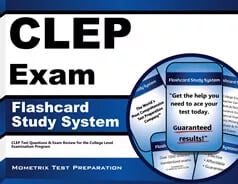Let’s face it, college can be daunting. Spending four or more years of your life listening to lectures and writing papers can be exhausting, not to mention figuring out how to pay for all of it. Whether you’re trying to save time or cut costs, CLEP exams provide a powerful tool for completing your degree and achieving your goals.
Why Take a CLEP Exam?
Taking a CLEP exam is like passing the final exam for a college class at the beginning of the semester, exempting you from the entire course. This means while your friends have to sit through lectures, write papers, complete projects, and study for exams, you are already working on another course. Plus, CLEP exams cost less than 10% of the cost of traditional courses. With that in mind, here are ten tips and tricks for exam success:
1. Look at the Exam Outline
CLEP exams allow you to cash-in on knowledge obtained outside the classroom or in high school. While you may know a lot about American government from a high school class and personal study, the key is to understand the concepts covered on the American Government CLEP exam. Previously obtained knowledge is invaluable, but it needs to be evaluated in light of the test outline. Knowing the names of the last ten senators from Minnesota is great but will it be covered on the exam? Look at the outline and then begin studying particular areas where you are lacking.
2. Know that a “C” is Good Enough.
Generally, only 50 out of 80 is needed to pass a CLEP exam, which comes out to a grade of 70%. The catch is that a CLEP test will appear as a “P” for “pass” on your transcript whether you get a 50 or an 80. Since CLEP exams cover such a broad range of concepts, you are not expected to pass with flying colors. So don’t stress over becoming an expert and know that even the science phobic can pass Natural Sciences.

3. Use Flashcards for Key Terms
In college courses, every concept is assigned a name. It’s not enough to understand the principles of a concept; you need to know the name of the concept. Flashcards are a proven medium to help you learn and retain those terms and their definitions. Flashcards derive their effectiveness from their ability to help you store terms in your long-term memory, eliminating the need to cram the night before the exam. Every time you run across an unfamiliar word, jot down the term and its definition on an index card. Then go through the flashcards a few times a day.
4. Utilize the Review Button
When you are viewing a question during the exam and you are unsure of the answer choice you selected, click the review button. When you have answered all the questions, view any questions that you clicked the review button for and make corrections as needed. If you still have time after that, start at the beginning of the exam and review all of the questions.
5. CLEP Study Guides

No amount of testing tips can replace the need to study for your exam. Even if you feel comfortable with the content, brushing up on key terms and concepts never hurt anyone. To save time, focus on using materials specifically designed for CLEP exam preparation. Sure, a business law textbook will cover relevant content for the Business Law CLEP exam, but it’s prone to cover too many concepts. Furthermore, textbooks have a way of delving into nitty-gritty details. Since a CLEP exam covers an entire college-level course, you don’t need to know the formula for determining currency appreciation. Rather, understanding the general concept will be sufficient for the Principles of Macroeconomics CLEP exam. A good CLEP study guide cuts through the fluff to teach you what you really need to know. A good study guide cuts through the fluff to teach you what you really need to know.
6. Ask for Help
Deciding to take a CLEP exam doesn’t relegate you to an island to study. Chances are, you know someone who has spent extensive time studying the material you are trying to master. Ask a friend, professor, or adult you know to help you understand concepts you are struggling with. Quick life insight: people love talking about themselves and subjects they know a lot about. Since your friend’s life probably won’t be on your exam, focus on the subject they know a lot about! A friend’s help does not replace the need for a study guide, but it can give you a big study boost
7. Take a Practice Test
Studying requires understanding a wide variety of concepts. So after you feel that you have covered the vast majority of content, it’s time to take a practice test. Practice tests help you identify the gaps in your knowledge. If you have been studying for the Biology CLEP exam, then you likely have an understanding of the cell. Taking a practice test will show that you don’t know the function of mitochondria. Immediately, you can hone in your studying to focus on that gap in your knowledge. A few sample questions can be found on the test developer’s website.
8. Answer Every Question
CLEP test takers are not penalized for wrong answers. Be sure to select an answer to every question, even if it means making a blind guess. If you are running out of time, selecting a random answer at least gives you a shot at choosing the correct answer. If you don’t select an answer, you will get the question wrong 100% of the time!
9. Use Guessing Strategies
Unlike a test a professor gives you, CLEP exams are not based on a single source. In other words, the CLEP exams are not developed from the lecture notes of a professor or a certain textbook. This means you will encounter a question or two that you are unfamiliar with. Relax, remain positive, and use the process of elimination to give yourself a better chance at success.
10. Look for Hints in the Exam
Occasionally, a question in the exam will hint at the correct answer to another question. For example, one question might ask which branch of government interprets the laws. Then a future question might read, “From which court case does the judicial branch derive its power to interpret laws?” The second question has essentially answered the first question for you. You will rarely find an instance that straightforward, but nevertheless, test questions that cover similar content can give you hints.
With those tips under your belt, you will be on your way to CLEP success!


Hi! where can i take the CLEP tests?
Hi Paulina! We suggest to check out College Board (https://clep.collegeboard.org/) which is the official website for the CLEP exam. You can get all of your information there regarding how to register and where to take the exam. Good luck!